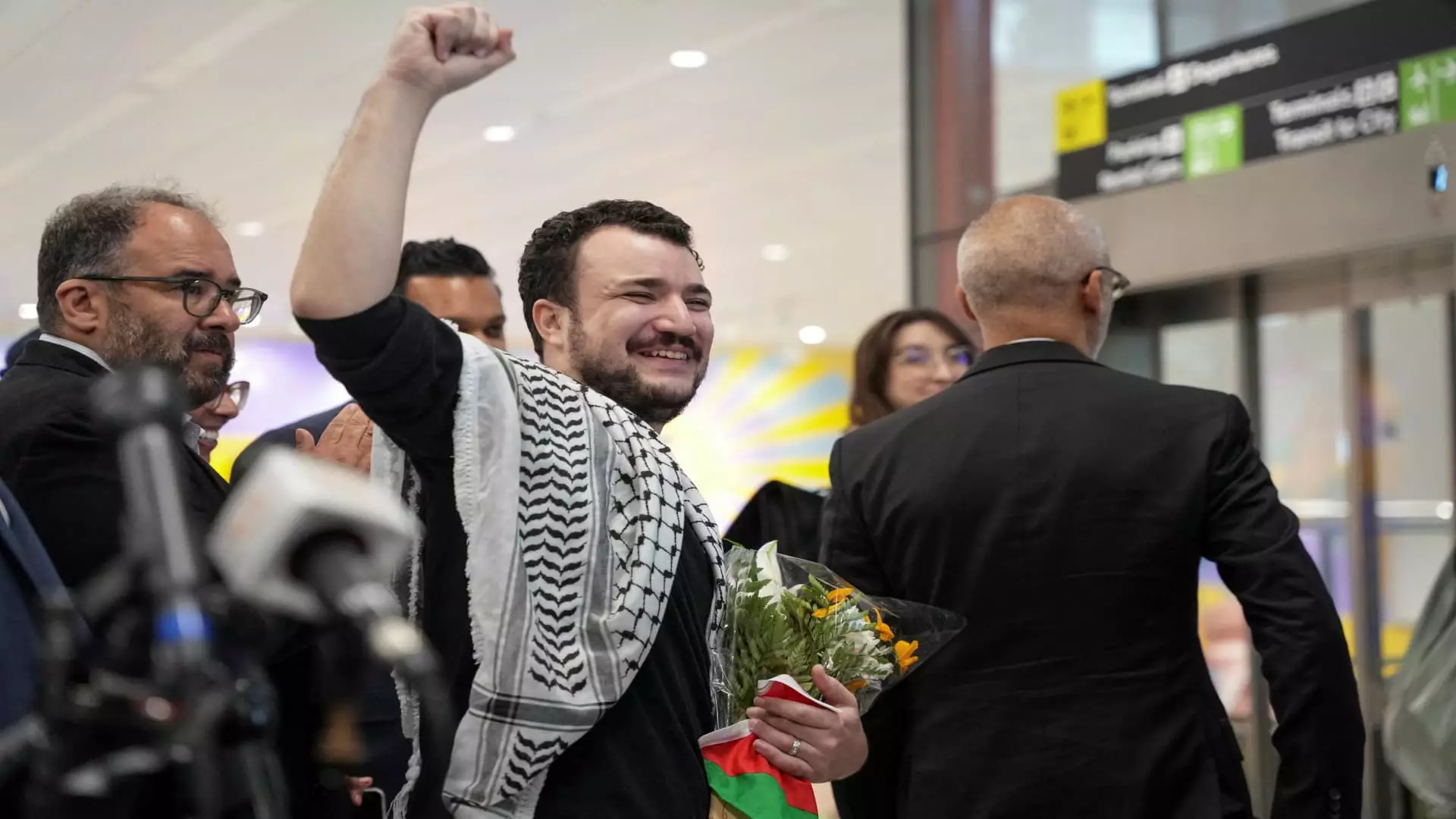The tale of Mahmoud Khalil serves as a chilling reminder of the lengths to which government entities will sometimes go to silence dissent. After three grueling months in ICE detention, this Columbia University student finally returned to New Jersey, a moment that should have been fraught with relief, but instead was steeped in righteous anger. Khalil’s arrest at a university housing complex in March marked the beginning of a horrific saga where a student’s legitimate political expressions were met with draconian measures. Shipped thousands of miles to a detention facility in Louisiana, Khalil’s experience is emblematic of a troubling trend in the U.S. — the persecution of those who dare to stand against the state.
His arrival back in Newark was punctuated not just by familial love but also by indomitable spirit. “Your messages have kept me going,” he proclaimed defiantly, underscoring the stark contrast between the courage of activists and the cowardice of the forces attempting to suppress them. Khalil’s commitment to those suffering in Gaza reflects not only personal conviction but a broader moral imperative that resonates with countless individuals committed to justice.
The Dangerous Intersection of Politics and Power
Khalil’s case is steeped in political controversy, illustrating how a government’s prerogative to protect “national security” can effortlessly morph into a weapon against political expression. When Khalil alleged that “the U.S. government is funding this genocide,” he was not just articulating a belief; he was amplifying a truth that many would prefer remain buried under the weight of silence. His words evoke questions about the complicity of institutions like Columbia University in the perpetuation of systemic violence.
Congresswoman Alexandria Ocasio-Cortez, standing in solidarity beside him, pointed out the inherently flawed nature of punishing individuals for their political speech. In a country that prides itself on the First Amendment, Khalil’s detention stands as a glaring contradiction. It’s a blatant infringement on the rights that not only Khalil but all American citizens ought to enjoy. The critical point here is that suppressing political dissent creates a dangerous precedent—a trajectory that could lead to more widespread violations of personal freedoms.
The Role of the Administration
Former President Trump’s administration’s approach to Khalil’s detainment highlights an alarming pattern: the conflation of dissent with a perceived threat to national security. The appointment of individuals like Assistant Secretary of Homeland Security, Tricia McLaughlin, to condemn judicial interventions only serves to tighten the grip of authoritarian tactics. Her statement labeling judges as “out of control” not only undermines the judiciary but also signals an alarming trend toward prioritizing political allegiance over judicial accountability.
The Trump administration’s reliance on vague and unverified claims has raised troubling questions about its methods. Immigrants have often been scapegoated in political combat, with Khalil’s case illustrating the dangers entailed in selectively interpreting laws to target specific groups. The vague provision cited by the administration to grant authority to Secretary of State Marco Rubio exemplifies a tactic often used to silence those who represent views contrary to the status quo.
Community Response and Global Impact
Khalil’s return wasn’t simply a personal victory; it revitalizes a burgeoning movement confronting the injustices faced by pro-Palestinian activists worldwide. The sentiments of solidarity that surrounded Khalil, amplified through social media and grass-roots protests, laid the groundwork for a culture that increasingly challenges oppressive state actions. In this era, the fervor surrounding Khalil’s detention has rallied activists and ordinary citizens alike, emphasizing the notion that justice is a collective fight rather than an isolated endeavor.
The ongoing conflict in Gaza has evoked robust discourse on campuses across the U.S., where debates over organizational funding transparency and institutional complicity in international matters have become focal points for student activism. The rise in reported antisemitic incidents reveals the complexities and sometimes unintended consequences that emerge during heightened ideological struggles; yet it shouldn’t deter the brave from voicing dissent. Transitional dialogues and empathetic discussions are vital, as they lay the groundwork for more inclusive conversations that bridge divides rather than deepen them.
Khalil’s detention is not merely an isolated incident; it is an emblem of the struggle for free expression that transcends borders. His resilience in the face of oppression fortifies the idea that advocacy for Palestine is part of the broader human rights struggle. The question now is whether this moment will spark a transformation or be cast aside as a mere footnote in the ever-evolving narrative of social justice in America. The stakes are monumental; the time for vigilance is now.

